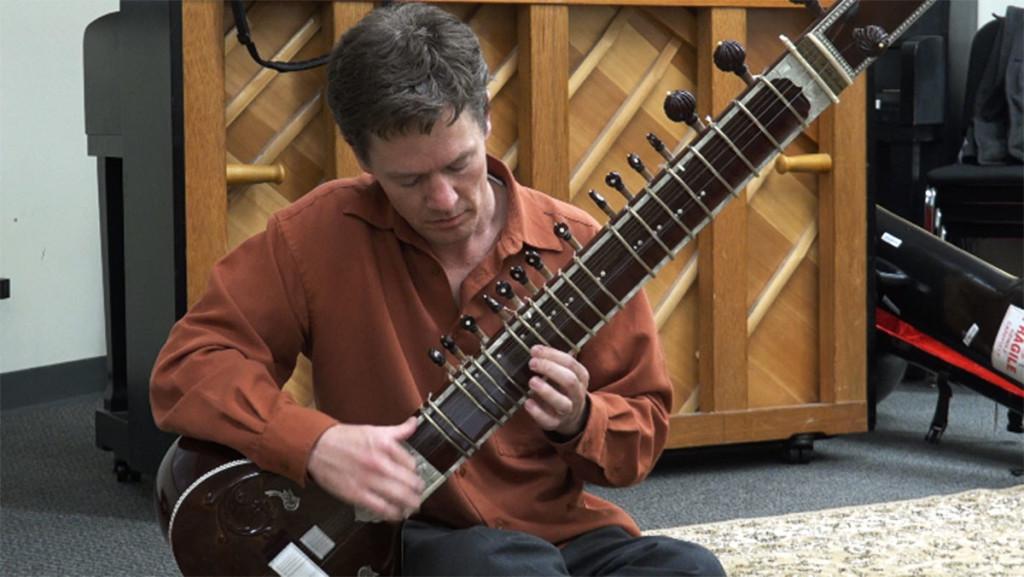Sitting cross–legged on circular pillows, 19 Ithaca College music and anthropology students joined with ethnomusicologist Stefan Fiol to sing scales from “Raga Bhairav,” a series of melodic scales that traditionally implore the supreme Hindu god Krishna to wake up after the sun has risen. All of his people, children, kings and cowherds wait to catch a glimpse of his fearful yet meditative countenance.
For the third installment of the college’s Raga workshop series, A Master Class on Sitar, anthropology associate professor Denise Nuttall said she submitted a proposal from the college to host Fiol, professor of musicology at the University of Cincinnati, to conduct a master class in traditional Hindustani, or North Indian, music and Raga theory. The workshop took place at 7 p.m. April 26 in room 2330 of the James J. Whalen Center for Music. The first two master classes occurred during the fall semester, both of which Nuttall said garnered a full house.
A “Raga” is a melodic framework rooted in South Asian musical genres that employs nine cycling music notes. Whereas western music emphasizes a set composition, Raga allows for more freedom for the artist to improvise.
“You start with one rhythmic cycle, and you stay in that until the end,” Fiol said. “But in that, you’re generating interest from limited materials. It’s very freeing.”
Fiol said the scales are either sung or played on the sitar, a plucked string instrument with roots in classical Indian music. Fiol said the modern sitar, with an elongated neck and sympathetic strings that vibrate in response to being plucked, is constructed to replicate the rich vocal qualities of Indian music.
Fiol performed seven different melodic scales of Raga Bhairav on the sitar in a repeating cycle with drumming in the background. Every so often, Fiol would vary the melody based on his intuition with the music. Fiol said rather than a linear melodic composition like in Western traditional music, Raga Bhairav has a very small portion of its melody that is composed and relies on variations of its standard melodic scales.
Fiol taught the students the different scales of Raga Bhairav, sometimes switching out the words for melodic syllables that make up an octave in classical Indian music known as the “sargam.”
Fiol said the music is either sung to lyrics, Hindustani syllables or simply “ah.”
Fiol said students taught in the European tradition of music are challenged by the Raga’ s nuanced and improvisational approach to melodies. He said this challenge offers students a chance to use their creativity and imagination.
“It’s kinds of themes and variations that are composed on the spot,” Fiol said “You’re having to generate new material through your own imagination using a very limited set of materials.”
Nuttall said that in addition to offering students cultural and musical insight, students take the raga workshop because it offers meditative insights into themselves.
“It’s a way to discipline the mind and the body and to engage with the spirit,” she said. “They may never play after the lab, but it doesn’t matter. What they’ve learned — it’s embodied in the mind and the heart.”
Christian Chesanek, first-year music performance graduate student, said as someone who seeks to dedicate his life to playing the sitar, it was eye-opening to see a performer internalize the instrument before him.
“I think a lot of us are really into planning and not necessarily living for the day, and this really required you to live in the present moment,” he sai














